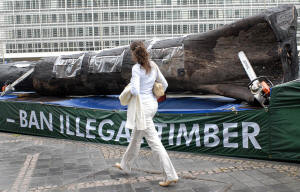EU pushes back deforestation law by a year after outcry from global
producers
 Send a link to a friend
Send a link to a friend
 [December 04, 2024] By
RAF CASERT [December 04, 2024] By
RAF CASERT
BRUSSELS (AP) — The European Union agreed to delay by a year the
introduction of new rules to ban the sale of products that lead to
massive deforestation, caving in to demands from several producer
nations from across the globe and domestic opposition within the
27-nation bloc.
Officials said Wednesday that the EU member states, the EU parliament
and the executive Commission reached an agreement in principle following
weeks of haggling whether the initial rules would have to be watered
down even further than the simple delay by one year. Originally, it was
supposed to kick in this month.
The deforestation law is aimed at preserving forests on a global scale
by only allowing forest-related products that are sustainable and do not
involve the degradation of forests. It applies to things like cocoa,
coffee, soy, cattle, palm oil, rubber, wood and products made from them.
Deforestation is the second-biggest source of carbon emissions after
fossil fuels.

The lead negotiator among the different EU institutions, Christine
Schneider, called the delay to implement nature protection rules “a
victory,” adding it would give foresters and farmers protection from
“excessive bureaucracy.”
Environmentalists immediately criticized the move.
“With our planet’s forests destroyed further every day, we cannot afford
delays to much-needed environmental protection laws like the EU’s
anti-deforestation legislation," said said Giulia Bondi of the Global
Witness group. .
Officials from leading exporters of affected commodities — including
Brazil, Indonesia and the Ivory Coast — fear the regulation could act as
a trade barrier, hit small farmers and disrupt supply chains.
[to top of second column] |

A woman walks passed a 12-meter Amazon tree trunk placed in front of
the European Union Council building by environmental activists in
Brussels, July 2, 2008 (AP Photo/Thierry Charlier), File)
 Under the deal, the rules are now
scheduled to start Dec. 30, 2025, for large companies, and June 30,
2026, for small companies. The different EU institutions will still
have to individually approve the deal but since they agreed on the
measures, this is likely to be a formality.
In offering to delay the regulation by a year, the EU Commission has
said it heeded the complaints of several global partners about their
state of preparedness for the rules.
Some EU governments, including in Austria and Germany, have also
sought to water down the regulation or delay its introduction.
With the delay, some governments sought to add more measures that
would weaken the original rules and allow for more exemptions. Even
if that was not agreed to in the current deal, Schneider said that
the commission had “committed itself to updating the Deforestation
Law within a year.”
Greenpeace has said that the extension would condemn the world’s
forests to another year of destruction. It noted a U.N. finding that
an area of forest about the size of Portugal is cut down worldwide
each year.
"Instead of rolling back its environmental agenda, the EU needs to
keep its commitments and show leadership to tackle the climate
emergency,” said Bondi.
All contents © copyright 2024 Associated Press. All rights reserved |